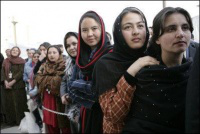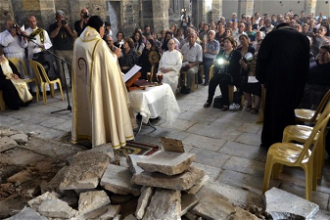CAFOD warns of 'critical time for women in Afghanistan'

Women outside US embassy Kabul 2006 - Wiki image
As politicians from around the world arrive in London to discuss Afghanistan’s future, CAFOD warns that more support must be given to local grassroots organisations that empower women.
On Thursday 4 December, around 70 foreign ministers from around the world will gather for the London Conference on Afghanistan, co-hosted by the British and Afghan governments.
The conference comes at a significant moment in Afghanistan’s history: for the first time, power has been transferred from one elected president to another based on a democratic process. However, with NATO troops pulling out of the country, many Afghans fear that there could be a reversal of the remarkable progress that has been made on women’s rights.
Yoko Yamashita, CAFOD’s Programme Officer for Afghanistan, says: “Now the final British combat troops have departed, Afghanistan is likely to drop out of the spotlight. It would be all too easy for the international community to move on and concentrate on other parts of the world. But for the sake of millions of Afghan women, we need to show our continued support. This is a critical point for women in Afghanistan. Over the last 12 years, the country has enshrined women’s rights in law, and there are now substantial numbers of female politicians, judges and military personnel, while record numbers of girls are going to school.
“But these changes are fragile, and the situation for many ordinary women remains dire. At the London conference next week, the world must make long-term commitments not only to the Afghan government, but also the grassroots organisations that empower women in rural communities.” CAFOD works with organisations like the Afghan Women’s Educational Centre (AWEC), which changes attitudes in local communities by training both women and men to mediate gender-related disputes peacefully and by helping women earn an income.
Zulaikha Rafiq, Executive Director of AWEC, says: “These days it is a normal sight to see streams of girls going to school. Men in government are also more supportive towards women’s rights. They know that half the population are women and they need their support to be successful under the democratic system.
“But there are still numerous cases where women in domestic settings are being tortured and killed. And some men still see women’s rights as the 'westernisation' of Afghan culture. Hard-line groups continue to target gender projects that they perceive as being un-Islamic.
“Gender inequality cannot be addressed by top-down efforts from the government alone. It also needs bottom-up efforts by people on the ground where ordinary women take action. It will take time and effort to make changes, but I hope the international community and the Afghan government will show a clear commitment to gender equality.”
Since CAFOD started working in Afghanistan in the late 1980s, the agency has prioritised women’s rights. Today CAFOD’s local partners are helping women in poor communities to earn a living, teaching women about their rights, and working with men’s groups to reduce domestic violence. With the support of the Catholic community in England and Wales, CAFOD will continue to put these women first over the months and years ahead.





















